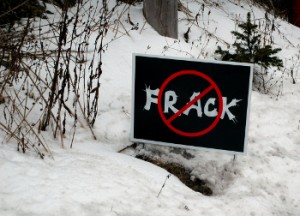
A sign on Nottingham Road reflects some local citizens’ opinions on the controversy of hydrofracking. (Jennifer Sheppard)
When energy companies started buying land for high-pressure water drilling in Central New York, they tapped into a lot of controversy.
At issue is what’s called “hydrofracking” or hydraulic fracturing, a method of injecting water under great pressure into deep wells to fracture shale and release natural gas. At risk, say opponents, is the groundwater and Skaneateles Lake, which supplies drinking water to the Syracuse area. But, say supporters, the risk is small and the country needs the new energy source.
“Ninety percent of the energy we produce in America requires hydraulic fracturing,” said Chris Tucker, spokesman for EnergyInDepth, a company specializing in U.S. energy resources. “It’s that important.”
But too little is known about the dangers, says Jack Ramsden, a member of Onondaga nation and opponent of the practice. “We need to be sure that it’s regulated properly,” said Ramsden.
The controversy is prompted by America’s hunger for fuel as energy companies pursue the natural gas in the thin layer of shale, called the Marcellus Shale, under much of Central New York. The Marcellus Shale has the largest concentration of natural gas in the southern tier of New York. And, experts say, it has the potential to be the second largest field of natural gas in the world, next to the one in Iran.
The hydraulic fracturing process would take place in the watershed that feeds Skaneateles Lake, one of the country’s cleanest lakes and supplier of drinking water to the city of Syracuse.
Local, state and federal governments have considered delays or even bans on hydrofracking.
Nationally, Congress recently ordered the U.S. Environmental Protection Agency to study hydrofracking’s effect on drinking water.
And in Onondaga County, Syracuse city officials strongly oppose to drilling in the Marcellus Shale, the city’s water coordinator, Lee Macbeth, told a public forum at Nottingham High School in February.
At the forum, county legislator Jim Corbett, R-Geddes, said drilling rights have been purchased on 1,300 parcels of land in the county. Corbett promised to introduce a resolution into the county legislature that would ban drilling on the 8,600 acres of property by the county, until all the environmental effects are researched.
In early March, Corbett was among 17 legislators voting in favor of a resolution calling on Gov. David Paterson to ban hydrofracking. The resolution was introduced by Tom Buckel, D-Syracuse. The two votes against the resolution were cast by Bill Meyer, R-Cicero, and Kevin Holmquist, R-Manlius.
Advocates of hydrofracking maintain that it is no more of an environmental threat than other methods of getting energy.
At the State University of New York at Fredonia, for example, energy researcher Gary Lash supports the drilling as a necessary trade-off. “It’s not enough to complain about the possible problems with natural gas exploration and ignore the effects of coal mining, or the effects of the burning of coal on the quality of air,” Lash said. “However, some people would maintain that by continuing to burn coal and oil will, in the long run, create greater risks than using natural gas.”
Some opponents of hydrofracking call for tighter regulations for hyrdrofracking. At least that would minimize the risks, said Ramsden of the Onondaga Nation. But in a perfect world, said Ramsden, “The Onondaga nation would like to have it not happen at all.”
(Jennifer Sheppard is a graduate student in magazine, newspaper and online journalism.)
-30-


